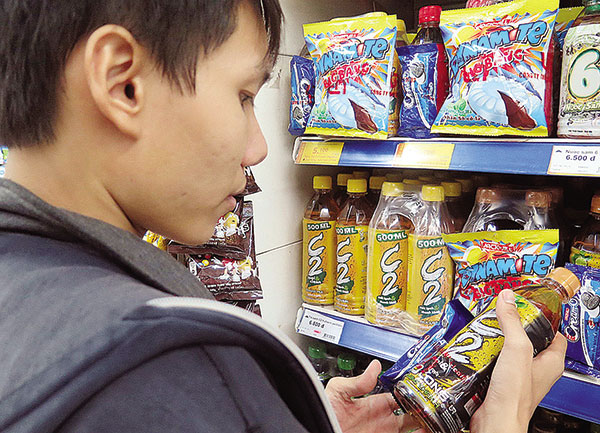Heavy metal incident causes a steep drop in URC sales figures
 |
| Vietnam is one of the world’s fastest-growing drinks markets |
According to results published by Universal Robina Corp (URC) this month, its sales dropped by 48.1 per cent in the second quarter of this year. URC’s renenue dropped as well, down 7.9 per cent to PHP7.614 billion ($152.2 million) due to a decline in sales volumes and additional investments in Vietnam.
However, the specifics about the additional investments in Vietnam were not included in this report.
URC consists of three main divisions: snack foods, beverages, and grocery products. The group manufactures and distributes a diverse mix of salty snacks, chocolate, candy, biscuits, bakery products, beverages, noodles, and tomato-based products in the Philippines and throughout Asia. Its green tea beverage C2 and ready-to-drink energy beverage Rong Do are well known locally.
However, URC president Lance Gokongwei told shareholders that the firm’s Vietnamese segment is still on a path to recovery, with beverages showing signs of traction after the re-launch of C2 and Rong Do last February.
Monthly sales in Vietnam hit a high of $20-$25 million before the recall was issued – C2 and Rong Do were said to have contained toxic amounts of lead. After the recall, however, sales plunged to a very low level. “We hope to end the year at $13-$14 million. To bring it back to $20-$25 million, we’re probably looking at a 2-3 year timeframe,” Gokongwei said.
The Vietnam Ministry of Health announced the imposition of a fine of more than VND5.8 billion ($260,000) for producing and selling lead-contaminated products. According to the ministry, a batch of C2 produced on February 4, 2016 and a batch of Rong Do made on November 10, 2015 were found to contain high levels of lead. Test results showed these batches have a lead content of 0.053 to 0.085 milligrammes (mg) per litre, above the acceptable limit of 0.05 mg per litre.
The lead contamination scandal has damaged the reputation of the company, and consumers remain wary of its products.
To start the road to recovery, URC has re-launched C2 and Rong Do under a “passion for quality” brand-building exercise, with a fresher look and packaging. The company has secured certifications from independent organisations, assuring that its factories adopt the highest standards in food safety manufacturing.
When asked if the Vietnam business will fully recover, Gokongwei said, “we knew it would be difficult and it’s a long road, but we’re willing to invest”.
URC plans to focus on innovation and launching brands in untapped segments within snack foods and non-alcoholic beverage segments in the local market.
According to a Euromonitor report released last year, over the forecast period, soft drinks are expected to continue recording positive retail growth (at constant 2016 prices) but at a slower rate. The main reason is because many soft drinks categories will approach maturity during this period. In addition, the food-safety scandals during the review period are expected to have an ongoing negative impact on the industry’s forecast performance.
The report stated that in 2016, the soft drink industry witnessed many scandals related to the production quality of major players like URC. As these brands have been popular in the country for years, consumers are concerned about their health. Accordingly, they are becoming more prudent when purchasing certain types of soft drinks, which is the main factor behind the slower growth in soft drink sales last year.
In recent years, Vietnamese customers have become increasingly aware of health and wellness products due to higher rates of diabetes, high blood pressure, and cancer. For this reason, there has been a noticeable shift in preferences toward more nutritious drinks with less sugar and caffeine. With higher disposable incomes, many consumers have become more willing to pay extra for healthier products.
What the stars mean:
★ Poor ★ ★ Promising ★★★ Good ★★★★ Very good ★★★★★ Exceptional
Latest News
More News
- State corporations poised to drive 2026 growth (February 03, 2026 | 13:58)
- Why high-tech talent will define Vietnam’s growth (February 02, 2026 | 10:47)
- FMCG resilience amid varying storms (February 02, 2026 | 10:00)
- Customs reforms strengthen business confidence, support trade growth (February 01, 2026 | 08:20)
- Vietnam and US to launch sixth trade negotiation round (January 30, 2026 | 15:19)
- Digital publishing emerges as key growth driver in Vietnam (January 30, 2026 | 10:59)
- EVN signs key contract for Tri An hydropower expansion (January 30, 2026 | 10:57)
- Vietnam to lead trade growth in ASEAN (January 29, 2026 | 15:08)
- Carlsberg Vietnam delivers Lunar New Year support in central region (January 28, 2026 | 17:19)
- TikTok penalised $35,000 in Vietnam for consumer protection violations (January 28, 2026 | 17:15)
















 Mobile Version
Mobile Version